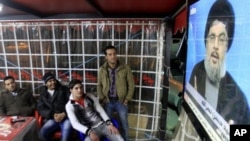(( Title: Lebanon Hezbollah Chief
HEAD: Hezbollah Chief Calls for New Leadership in Lebanon
DATE: 01/16/11 18:24:26.000
BYLINE: Heather Murdock
DATELINE: Beirut
NUMBER: 463137
TYPE: CR ))
People watch the speech of Hezbollah leader Hassan Nasrallah on a screen at a cafe in the southern port city of Sidon, Lebanon, Sunday, Jan. 16, 2011. The leader of Lebanon's Shiite militant group Hezbollah says Saad Hariri should not return as prime minister. Nasrallah made his first public comments Sunday since ministers from his movement and their allies resigned from the Cabinet on Wednesday, toppling Hariri's Western-backed government. (AP Photo/Mohammed Zaatari)
For the first time since the Lebanese government collapsed on Wednesday, Hezbollah’s leader spoke today, accusing the U.S., Israel, and the international tribunal investigating the 2005 murder of Prime Minister Rafik Hariri of trying to destabilize Lebanon.
Hassan Nasrallah, the leader of Hezbollah, which is allied with nearly half of the Lebanese parliament, did not say who he wants as the country’s new prime minister. But he was clear about who he does not want: Sa’ad Hariri, the son of the slain prime minister, who was unseated as prime minister last week.
Nasrallah said he will not support any government that cooperates with The Special Tribunal for Lebanon, a UN-backed court set up to investigate the 2005 assassination of Prime Minister Rafik Hariri. In the coming days, the tribunal prosecutor is expected to hand indictments of Hezbollah members to judges for review. Hezbollah maintains these indictments are political attacks on the organization, based on lying witnesses.
This comes as the Lebanese parliament prepares for what is expected to be a bitter fight over who will be the next prime minister. Sa’ad Hariri’s government fell Wednesday when 11 ministers, most from Hezbollah, resigned. Parties are expected to announce their preferred candidates Monday.
Lebanon’s two major political coalitions, March 8 and March 14, are deadlocked over the issue of The Special Tribunal for Lebanon, which sparked Wednesday’s walk-out.
March 14, which is the ruling party of Sa’ad Hariri, supports the court.
March 8, the opposition coalition that includes Hezbollah, does not. Hezbollah, a Shi’ite political party and militia backed by Iran and Syria, says the court’s goal is to discredit the organization, not to find the killers.
Both sides say they will only accept a new government that agrees with them on this issue. March 14 says Sa’ad Hariri is the only man for prime minister. March 8 says he is not.
March 14’s General Secretary Fares Souaid says his coalition does not intend to compromise. "We support three main points. First, we support the international tribunal. Second, we support Sa’ad al-Hariri as prime minister. Third, we support stability and peaceful democracy in Lebanon," he said.
But peace and stability in Lebanon is becoming harder to maintain. Lebanese journalist and political analyst Hazem Saghieh says even though Hezbollah has called for peaceful change that falls within legal boundaries, it may not be able to contain growing sectarian tensions. "A spontaneous clash might take place in any of Beirut’s streets and might lead to a bigger conflict which is unpredictable now," he said.
Political leaders from all political parties have called for peace on the streets. Saghieh says that if the parliament decides on Sa’ad Hariri, and government continues to recognize the court, Hezbollah might be forced into a corner. In 2008, Hezbollah took over West Beirut in a matter of days.
Volatility in Lebanon has also worried leaders in the region and all over the world. Leaders from Qatar, Syria and Turkey are expected to meet in Damascus on Monday. Israeli Prime Minister Benjamin Netanyahu also expressed concern about the increasing chaos in the region, saying that any new peace treaty with Palestine would have to include stronger security measures.
Hezbollah Chief Calls for New Leadership in Lebanon





